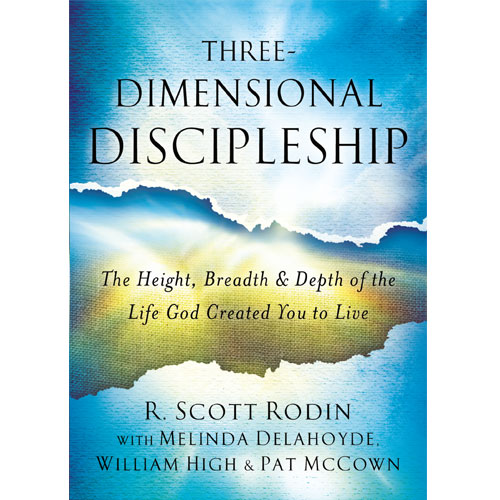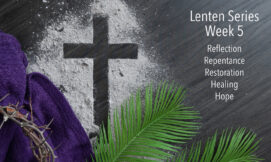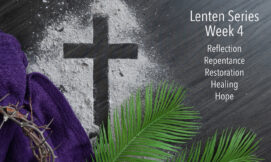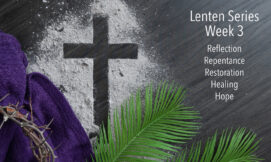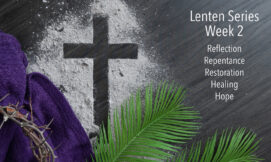Back at the Tree — Your Eyes Will Be Opened
Week #3

Lent is a time of repentance. Repentance requires us to name and confess our sin. Naming sin is the first and perhaps most transformational step in our Lenten journey.
We are in a day where the very concept of sin is anathema. In response, we as followers of the Jesus of the cross, must not be conformed to the standards of this world. The church of Jesus Christ must continue to be a confessional church, or it is not worthy of the name it bears.
To help us on this journey of confession and repentance, we are using the four remaining weeks in Lent to go back to the scene of the original sin and consider where and how we might be reenacting that sin in our own lives. Here is our text for these lessons.
Now the serpent was more crafty than any of the wild animals the Lord God had made. He said to the woman, “Did God really say, ‘You must not eat from any tree in the garden’?” The woman said to the serpent, “We may eat fruit from the trees in the garden, but God did say, ‘You must not eat fruit from the tree that is in the middle of the garden, and you must not touch it, or you will die.’” “You will not certainly die,” the serpent said to the woman. “For God knows that when you eat from it your eyes will be opened, and you will be like God, knowing good and evil.” When the woman saw that the fruit of the tree was good for food and pleasing to the eye, and also desirable for gaining wisdom, she took some and ate it. She also gave some to her husband, who was with her, and he ate it. (Genesis 3:1-6)
We are focusing on four statements the enemy made that led to this catastrophic failure on behalf of the first couple:
• “Did God really say?”
• “You will not certainly die.”
• “Your eyes will be opened.”
• “You will be like God.”
Week Three – “Your eyes will be opened.”
As with so many paths that lead to destruction, we see in this third act the cumulative impact of the lies proffered by the enemy. In a winsome and insidious way, the serpent is guiding the conversation into deepening levels of deceit without the victim realizing they have moved at all.
That is the only way to explain what seems like a rather absurd suggestion. Standing in the midst of the Garden of Eden with only perfection and provision around them, the serpent insinuates that Adam and Eve are actually blind. It is a not-so-veiled accusation that God is holding something back from them. This brazen allegation is only possible because of the ground already covered. Once the truth of God’s word is brought into question (did God really say?) and the consequences of disobedience dismissed (you will not certainly die), it is not too great a step to question whether God can be trusted to have given them all they need, or whether there is more to be known that can only be grasped by one’s own act.
And that is the heart of the deception. The enemy convinces us that what God has revealed to us is not enough. We must discover for ourselves a new truth, a better revelation, a more culturally relevant insight. We need to open our eyes, relying on our own wisdom and leaning on our own understanding, despite God’s command not to do so (Proverbs 3:5).
Why would we do this? To understand why this temptation seems so enticing to so many today, let’s consider the famous axiom by St. Anselm, fides quaerens intellectum, or faith seeking understanding. Having anchored the Christian’s life in an unshakable faith, Anselm’s methodological formula providesthe basis upon which one could pursue answers. We move from faith to the pursuit of answers to life’s challenges. But the answers we seek must always be modified by our faith convictions.
At the tree, the serpent sought to reverse the order and lure the first couple into the false promise of grasping understanding for themselves apart from faith. It is an act of spiritual hubris.
Human history has demonstrated consistently that where God’s word is not enough, we will, in our own pride and arrogance, fill in what we believe to be missing. Using worldly wisdom (leaning on our own understanding) we then claim that ‘our eyes have been opened’. This is the justification for much of what is called progressive theology. The story line goes that what has been handed down to us is not enough. We are smarter, cleverer, and more sophisticated now. God’s word needs deconstructing and reframing to suit the issues of our day. In our arrogance we parrot the words of Jesus, “You’ve heard it said, but I say…” The problem is, we are not Jesus. But isn’t it interesting that it was just this idea that the enemy planted in the mind of the first couple right before his fourth and final lie – that they would ‘be like God’.
The desire to have our eyes opened is a seductive temptation in our self-absorbed culture. It is the promise of educational elites who see their job as dismantling orthodoxy in place of the AvantGarde. It is the goal of religious leaders who are desperate to make God’s word comfortable and ‘relevant’. They scurry around seeking authoritative voices to support their positions, then smugly label those holding firm to the truth as backward and blind. Yet the word itself finds them out, as Paul charges, “They exchanged the truth about God for a lie and worshiped and served created things rather than the Creator” (Romans 1:25), and Paul’s warning to Timothy, “For the time will come when people will not put up with sound doctrine. Instead, to suit their own desires, they will gather around them a great number of teachers to say what their itching ears want to hear. They will turn their ears away from the truth and turn aside to myths.” (1 Timothy 4:3-4)
This is the price we pay when we refuse to take God at his word but seek instead to go beyond it or behind it or around it to find a more convenient truth. Be assured those who seek such enlightenment will surely find it, although it will not be the Holy Spirit that is opening their eyes.
This Lenten season, is God’s word enough for you? Even when its message is countercultural? Do we trust that God’s revelation to us is for our good? That our eyes are never more open than when we allow the Holy Spirit to transform us with God’s truth? Where do we need to repent of our lack of faith in the goodness of God who has given us his word as “a lamp unto our feet and a light unto our path”? (Psalm 119:105)
As we journey to the cross, let us reject the temptation to run after convenient answers that come at the cost of biblical faithfulness and absolute trust, and cleave only to the ‘man upon the cross’ in whom we have all we need.

